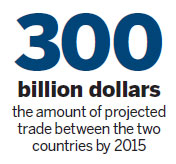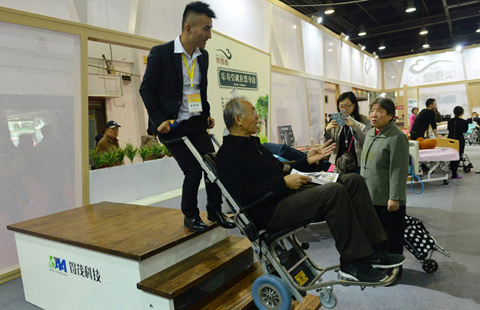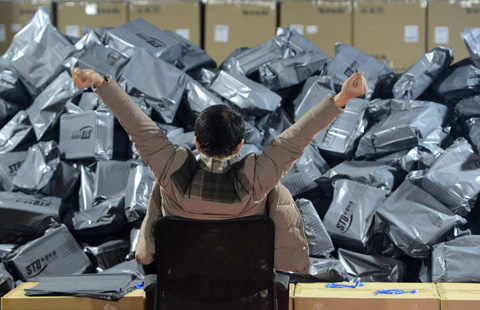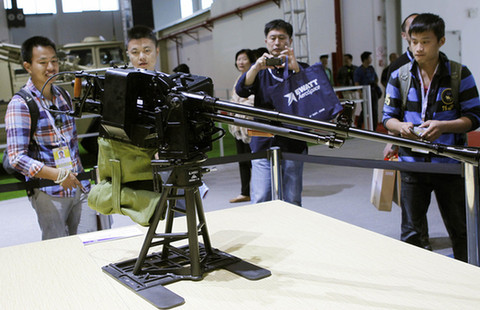FTA negotiations launched
By Li Jiabao (China Daily) Updated: 2012-05-03 09:17China, South Korea trade talks to take cooperation to a higher level
China and South Korea jointly announced the start of bilateral free trade agreement negotiations on Wednesday, aiming to expand trade in goods and services and investment cooperation.
|
 |
"The first round of negotiations will take place later this month ... and I hope the negotiations can be finished within two years," Chinese Minister of Commerce Chen Deming told a news briefing in Beijing.
"After seven years of preparation, the launch of the FTA negotiations is a turning point to take bilateral cooperation to a higher level.
"We hope the accord will also serve as a starting point for the economic integration of East Asia," said South Korean Trade Minister Bark Tae-ho.
Chen also said the two countries complement each other in many ways and that offers broad prospects for cooperation.
He said the start of the FTA negotiations will not only benefit people in both countries but also advance the economic integration of East Asia amid rising protectionism and a slow global economic recovery.
"China's fast economic development and the efforts to expand domestic consumption, as well as South Korea's high dependence on trade for GDP growth are the main reasons for South Korea to seek a free trade pact with China," said Wang Ling, chair of the University Council of the University of International Business and Economics in Beijing.
The two countries will first establish the framework for talks, which will form the basis for negotiations covering goods, services, investment and other areas.
The level of liberalization for trade in goods will go beyond each country's commitment in the World Trade Organization, according to a joint ministerial statement on the launch of China-South Korea FTA negotiations.
The negotiations won't always go smoothly because of sensitive areas for each country, Wang said.
Bark said both countries have sensitive areas, which are agriculture and seafood for South Korea and the petrochemical, electronic and machinery industries for China, so negotiations will move forward in phases and special consideration will be given to these areas.
"We will 'isolate' the sensitive areas from the negotiations," he said.
China has become the biggest trade partner of South Korea and South Korea is China's third-largest trade partner.
Bilateral trade reached $245.6 billion in 2011, up 18.6 percent from the previous year. The two nations aim to expand bilateral trade to $300 billion by 2015.
South Korea has already signed FTAs with eight counterparties including the European Union, the United States and the Association of Southeast Asian Nations.
China's investment in South Korea is quite small and "the South Korea-China FTA will increase investments from China.
"Chinese companies can also tap the markets of the EU and the US through South Korea's FTAs with these two economies," Bark said.
South Korea, which is China's fourth-largest source of foreign direct investment, added $4.88 billion to its investments in China in 2011, lifting the cumulative figure to $51.16 billion.
China's investment in South Korea totaled $3.74 billion after an expansion of $650 million in 2011, mainly in services areas, according to Bark.
In addition to the bilateral FTA, the two countries are working with Japan on a three-way FTA.
"We reached a common conclusion that the bilateral pact will not conflict with the three-way accord but will be the foundation and driving force for it. The summit of leaders from the three countries, to be held in Beijing from May 13 to 14, will see positive signals for the arrangement of the trilateral FTA," Chen said during the news briefing.
Bark added that the three parties will "reach agreement in principle for advancing the China-Japan-South Korea FTA during the summit".
lijiabao@chinadaily.com.cn
- Aerial acrobats perform at China Airshow
- Chinese shares close mixed - Nov 14
- Alibaba gets 'A-plus' debt rating from agencies
- Asian firms score well on responsibility index
- Big data brings rewards as online shopping firms get creative
- Blue skies ahead for new flock of commuter lines
- Navigating the insurance maze
- Bonds to benefit as Connect lifts investor liquidity















